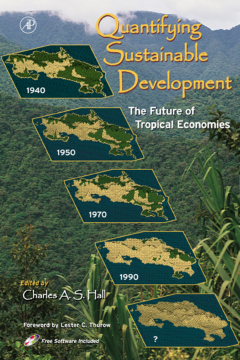
BOOK
Quantifying Sustainable Development
Charles A.S. Hall | Patrick Van Laake | Carlos Leon Perez | Gregoire Leclerc
(2000)
Additional Information
Book Details
Abstract
Until recently, the phenomenal economic development of the Asian tigers, Chile, and Malaysia, as well as the sustained economic growth of the United States, painted a very desirable and optimistic picture of free markets, fiscal responsibility, and, more generally, the entire dogma of neoclassical economics. As of the fall of 1998, however, the economies of many tropical countries have contracted severely, and the enthusiasm of the developing tropics for the free market and all of its ancillary policies is decidedly cooler. Have our traditional approaches to economics been failing the developing world?
This interdisciplinary book covers the conditions of the developing tropics, the resistance of some of their problems to earlier attempts at solutions, and the use of new tools to develop a much more comprehensive and empirical framework for analysis and decision making. It also presents the development of cutting edge technology that links GIS and modeling approaches with extensive databases on meteorology, soils, agricultural production, and land use. The book discusses whether development is sustainable through a synthesis of demographic, economic, and resource-specific considerations. Costa Rica is uniquely suited to this study because of its size, stage of development, democratic institutions, and national databases.
A CD-ROM containing all data and programs, color images, animated models, large data tables, and references accompanies the book.
- Links economic and biophysical analyses of sustainability
- Presents new tools and approaches for analysis and decision-making
- Includes a CD-ROM containing data and programs, color images, animated models, and references
"Hall et al. look behind the financial symbols of development to produce a critically needed empirical framework for integrating economic theory with biophysical realities." --Herman E. Daly, University of Maryland, School of Public Affairs
"The modeling system summarized in this book is simple ... I recommend this book to all readers of this journal."
ECOLOGICAL ECONOMICS
"I strongly recommend the book to economists, ecologists, geographers, agriculturists, biologists, engineers, agronomists, and others interested in development and preservation of environmental integrity ..."
--David Pimentel, College of Agriculture and Life Sciences, Cornell University, BIOSCIENCE, January 2001, Vol. 51, No. 1
"Includes a CD packed with images, data, and software, allowing the user to explore and adapt the GIS-based simulation model." --Tom Richard, Journal of Industrial Ecology
